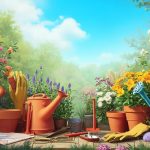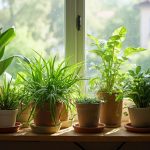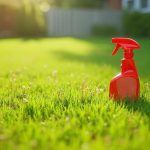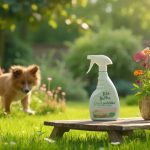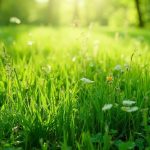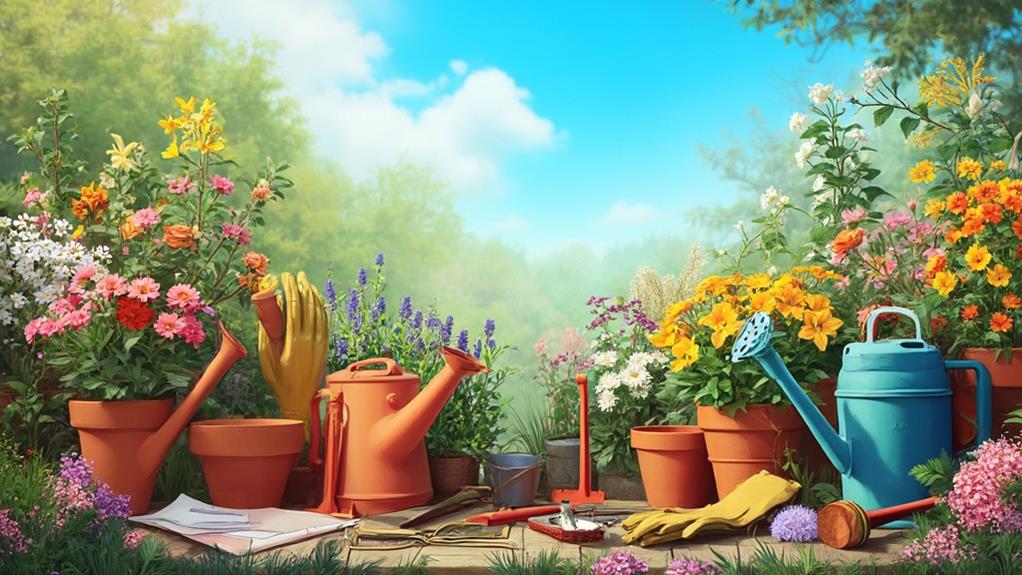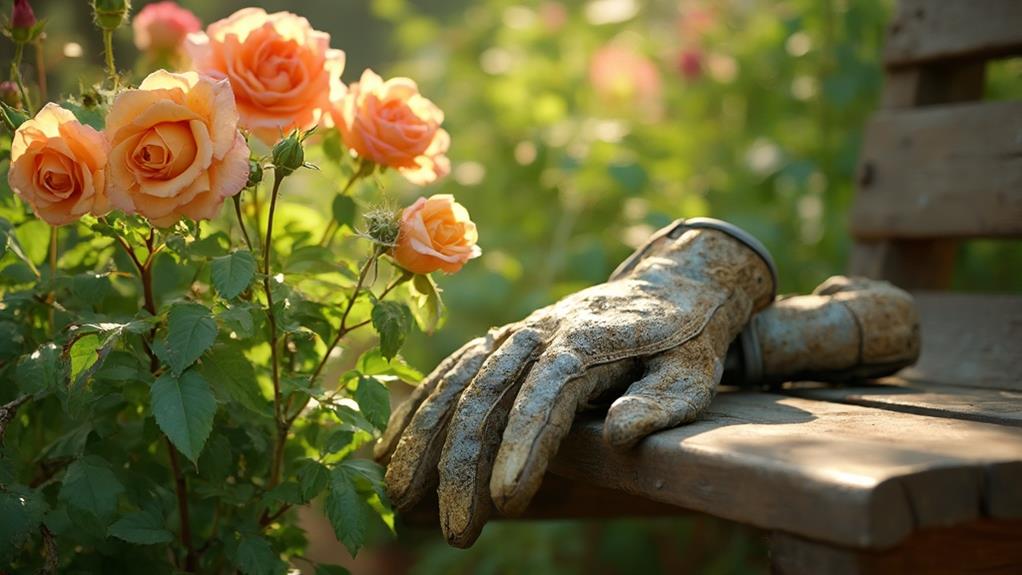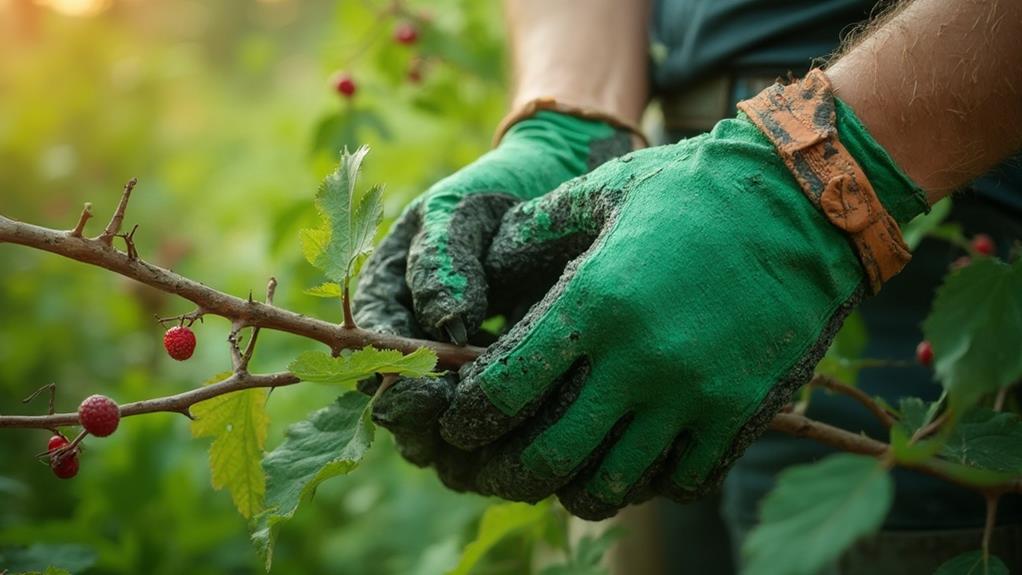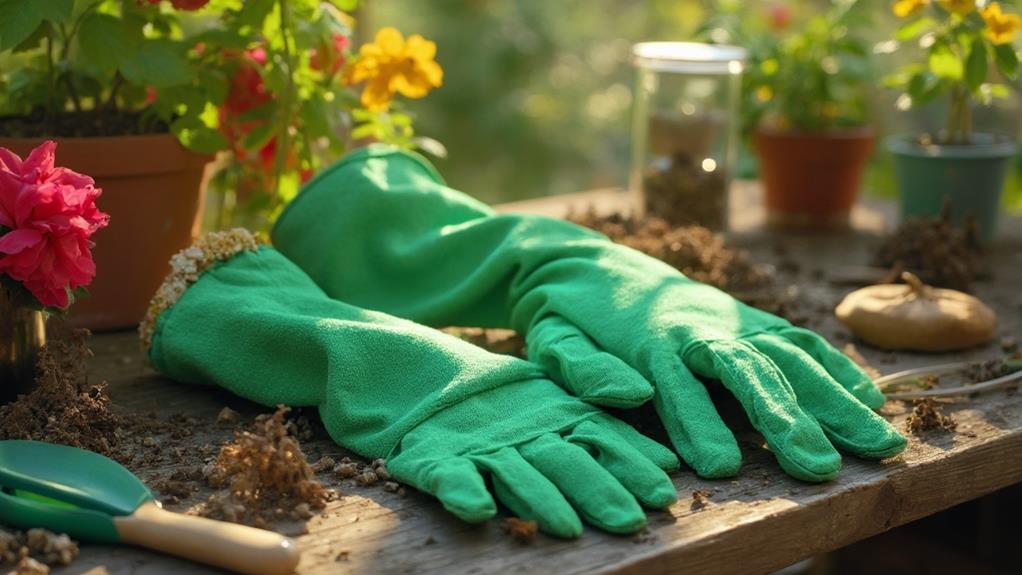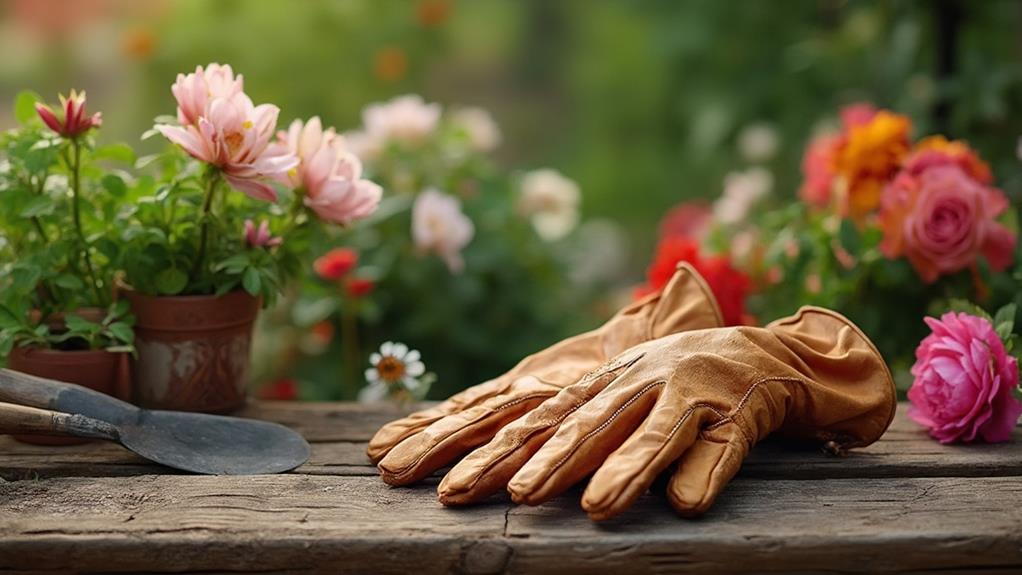When you think about gardening supplies in the UK, you might picture a vast assortment of tools and seeds, each tailored to specific needs. Whether you're looking for high-quality spades or unique plant varieties, the options can be overwhelming. It's important to contemplate what will truly enhance your gardening experience and guarantee your efforts yield the best results. As you explore these choices, you may find yourself questioning what truly makes a difference in your garden's success. What factors should you prioritize, and how can they influence your gardening journey?
Key insights
- Explore online gardening retailers in the UK for a wide variety of supplies, including tools, seeds, and fertilizers.
- Look for eco-friendly gardening products to support sustainable practices and reduce environmental impact.
- Check customer reviews to evaluate the quality of gardening supplies before making a purchase.
- Take advantage of seasonal promotions from UK gardening stores to save on essential supplies.
- Consider local garden centers for specialized plants and soil amendments tailored to your region's climate.
Essential Gardening Tools
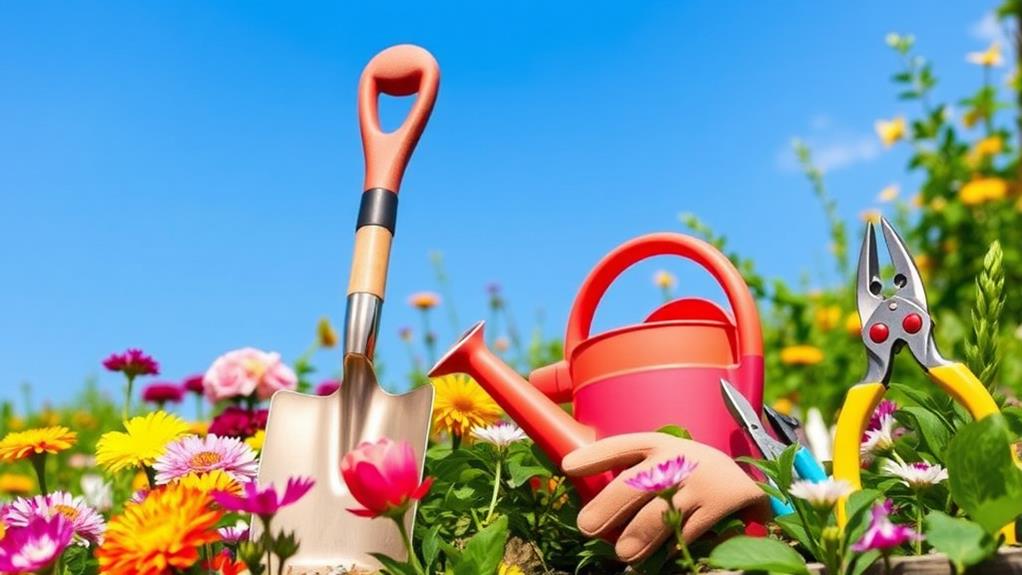
When it comes to gardening, having the right tools can make all the difference, and there are five essential tools every gardener should have in their arsenal.
First, a sturdy spade is important for digging and planting. Look for ergonomic tools that reduce strain on your back and hands.
Next, a hand trowel is perfect for smaller tasks, like transplanting seedlings or digging up weeds.
Don't forget about pruners; they're essential for maintaining healthy plants and promoting growth. Sharp, comfortable pruners will make garden maintenance much easier.
Additionally, invest in a good quality garden fork, which is ideal for aerating soil and mixing in compost.
Finally, a reliable watering can or hose with a spray nozzle guarantees your plants receive the right amount of hydration.
These essential gardening tools should be part of your gardening toolkits, making seasonal gardening tasks more enjoyable and efficient.
With the right equipment, you'll find it easier to cultivate your garden and keep it flourishing throughout the year.
Choosing Quality Seeds
Selecting quality seeds is essential for a thriving garden, and a few key factors can help you make the best choices. First, consider opting for organic seeds, as they're free from synthetic chemicals and promote a healthier ecosystem. Heirloom varieties are another great option, offering unique flavors and resilience.
When choosing seeds, pay attention to their packaging. Look for clear information on germination techniques and the ideal conditions for seedling care. It's also important to check the planting calendars to guarantee you're sowing at the right time.
To help you make informed decisions, here's a quick comparison of seed options:
| Seed Type | Benefits |
|---|---|
| Organic Seeds | Chemical-free, eco-friendly |
| Heirloom Varieties | Unique flavors, biodiversity |
| Hybrid Seeds | Higher yields, disease resistance |
| Open-Pollinated | Can save seeds for future use |
| Local Seeds | Adapts well to local conditions |
Lastly, proper seed storage is essential. Keep seeds in a cool, dry place to maintain their viability. With these tips, you'll be well on your way to selecting quality seeds for a successful gardening experience!
Types of Garden Soil
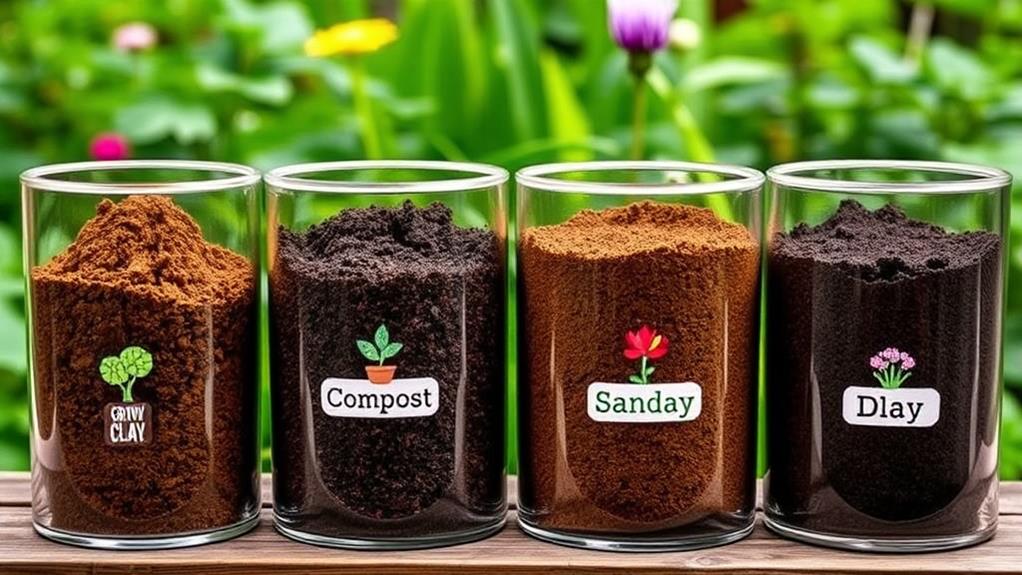
Understanding the types of garden soil is essential for your plants' success.
You'll find that soil quality directly impacts growth, and different common soil types have their own unique benefits.
Plus, exploring soil amendments and enhancements can make a significant difference in your garden's health and productivity.
Importance of Soil Quality
Soil quality plays an essential role in the success of your garden, influencing everything from plant health to nutrient availability. Understanding the different factors that affect soil quality can empower you to create the ideal growing environment for your plants.
One key aspect is soil testing, which helps you identify nutrient deficiencies and pH levels. By regularly testing your soil, you can tailor your amendments to what your garden truly needs.
Incorporating organic matter is another crucial step in improving soil quality. This can include compost, well-rotted manure, or leaf mold. Organic matter enhances soil structure, increases water retention, and provides important nutrients that plants crave.
Plus, it fosters a healthy ecosystem of beneficial microorganisms that promote plant growth.
You should also pay attention to drainage and aeration. Good soil should allow water to flow through without becoming waterlogged, while also providing enough space for roots to breathe.
Common Soil Types
Gardeners often encounter a variety of soil types, each with its unique characteristics that can considerably impact plant growth. Understanding these soil types is essential for successful gardening. The most common types include sandy, clay, loamy, and silty soils.
Sandy soil drains well but often lacks nutrients, making soil composition analysis essential to determine what amendments your plants might need.
Clay soil retains moisture but can become compacted, limiting root growth. Employing effective soil drainage techniques can help improve its structure.
Loamy soil, a blend of sand, clay, and silt, is often regarded as the ideal garden soil due to its balanced nutrient content and excellent drainage.
Silty soil is fertile and retains moisture well but can become compacted easily.
Identifying your soil type allows you to tailor your gardening practices. For instance, if you have heavy clay, consider using raised beds to enhance drainage.
On the other hand, if sandy soil dominates, regular fertilization will be key to sustaining plant health.
Soil Amendments and Enhancements
When it comes to enhancing your garden's soil, choosing the right amendments can make all the difference in plant health and productivity.
Start by conducting soil testing to determine the current nutrient levels and pH balance. This step is important, as it helps you identify what your soil needs.
One of the best amendments you can add is compost. The compost benefits are numerous: it enriches the soil with organic matter, improves drainage, and boosts microbial activity.
By mixing well-decomposed compost into your soil, you create a fertile environment that supports healthy root growth and nutrient uptake.
Other amendments to take into account include peat moss, which enhances moisture retention, and lime, which can raise the pH of acidic soils.
If you're dealing with heavy clay, adding gypsum can improve soil structure and drainage.
Fertilizers and Nutrients
To achieve vibrant, healthy plants, you'll need to pay close attention to fertilizers and nutrients. Understanding the role of soil nutrients is fundamental for successful gardening.
Start by identifying nutrient deficiencies in your plants, as these can hinder growth and vitality. Organic fertilizers are a fantastic option, providing a natural source of nutrients that improve soil health over time.
Consider using slow release nutrients to guarantee your plants get a steady supply of nourishment. This method reduces the frequency of fertilizer application, making your gardening routine more manageable.
Liquid fertilizers are another viable choice, especially when you want to provide an immediate nutrient boost.
Timing is critical; make sure you're applying fertilizers during the active growth phases of your plants. Remember the composting benefits, as compost can serve as a nutrient-rich amendment that enriches your soil naturally.
Incorporating these practices will enhance your soil's nutrient content and support robust plant growth. By focusing on the right fertilizers and nutrients, you set the stage for a thriving garden that thrives through the seasons.
Watering Equipment Options
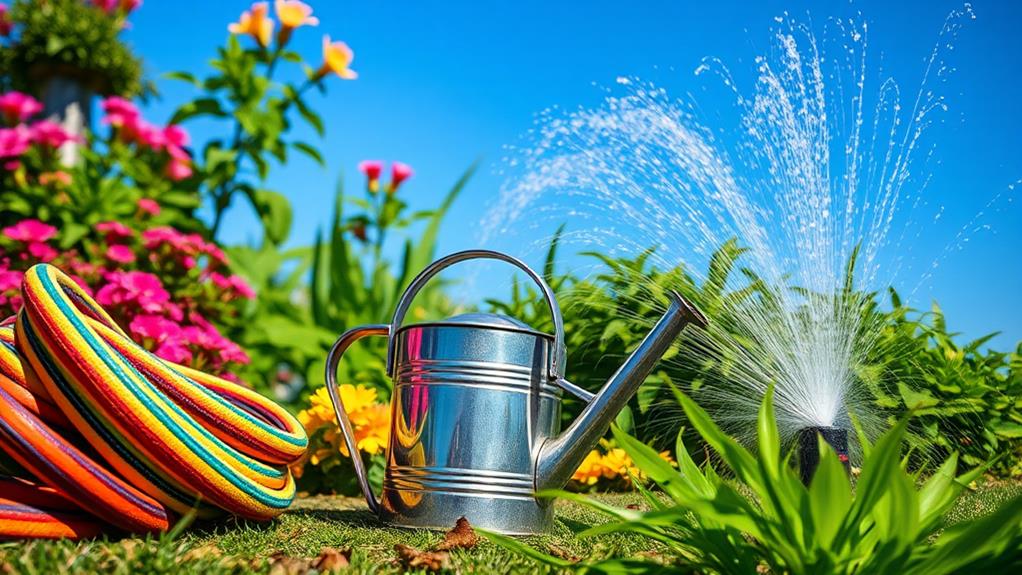
While guaranteeing your plants receive adequate moisture is essential for their growth, choosing the right watering equipment can make this task much easier. You have several options to take into account, depending on your garden's size and your personal preferences.
For small gardens, watering cans offer a practical solution for targeted plant hydration. If you're dealing with larger areas, garden hoses and hose reels are invaluable for their flexibility.
Automatic sprinklers can save time and guarantee even coverage, especially when paired with watering timers for precise scheduling.
For efficient water usage, think about drip irrigation systems. They deliver water directly to the root zone, minimizing evaporation and runoff. Additionally, rain barrels can collect natural precipitation, providing an eco-friendly watering source.
If you're keen on monitoring your plants' moisture levels, moisture meters can help you determine when it's time to water. For larger gardens or farms, portable tanks can store significant amounts of water, making hydration easier during dry spells.
Whatever your choice, investing in the right watering equipment will guarantee your plants thrive all season long.
Pest Control Solutions
When pests threaten your garden, you've got options to protect your plants.
You can choose natural pest control methods, which are often safer for the environment, or explore chemical solutions for more stubborn infestations.
Let's break down the pros and cons of each approach to find what works best for you.
Natural Pest Control Methods
Natural pest control methods offer effective solutions for maintaining a healthy garden without relying on harsh chemicals. One approach you can try is companion planting, where you strategically plant certain crops together to deter pests. For example, marigolds can repel nematodes and aphids, while basil planted near tomatoes can ward off whiteflies.
Integrating beneficial insects into your garden is another fantastic method. Ladybugs, lacewings, and parasitic wasps are nature's pest controllers, feeding on common garden pests like aphids and caterpillars. You can attract these helpful insects by planting flowers such as daisies or yarrow, which provide nectar and pollen.
Additionally, consider using homemade sprays made from natural ingredients like garlic or neem oil. These can help deter unwanted pests while being safe for your plants and the environment.
Implementing these natural pest control methods not only promotes a healthier ecosystem but also enhances your gardening experience. You'll feel empowered knowing you're protecting your plants without harming beneficial wildlife.
Chemical Pest Control Options
Chemical pest control options can be an important part of your gardening toolkit, especially when dealing with stubborn pests that threaten your plants. When considering chemical applications, it's vital to choose the right products and apply them correctly for maximum effectiveness.
Familiarize yourself with various chemical application techniques, such as spot treatment or broadcast spraying, to guarantee even distribution and minimize waste.
Before you engage, it's important to understand pest resistance strategies. Overusing the same chemicals can lead to pests developing resistance, making your efforts less effective. To combat this, rotate your chemical treatments and combine them with other pest management methods. This not only helps keep pests at bay but also reduces the chance of resistance developing.
Always read the labels and follow the instructions carefully to protect your plants, beneficial insects, and the environment.
Consider timing your applications during cooler parts of the day to minimize harm to non-target species. Remember, while chemical pest control can be effective, it's most beneficial when used as part of an integrated pest management approach.
Stay informed and proactive to keep your garden flourishing!
Planting Accessories
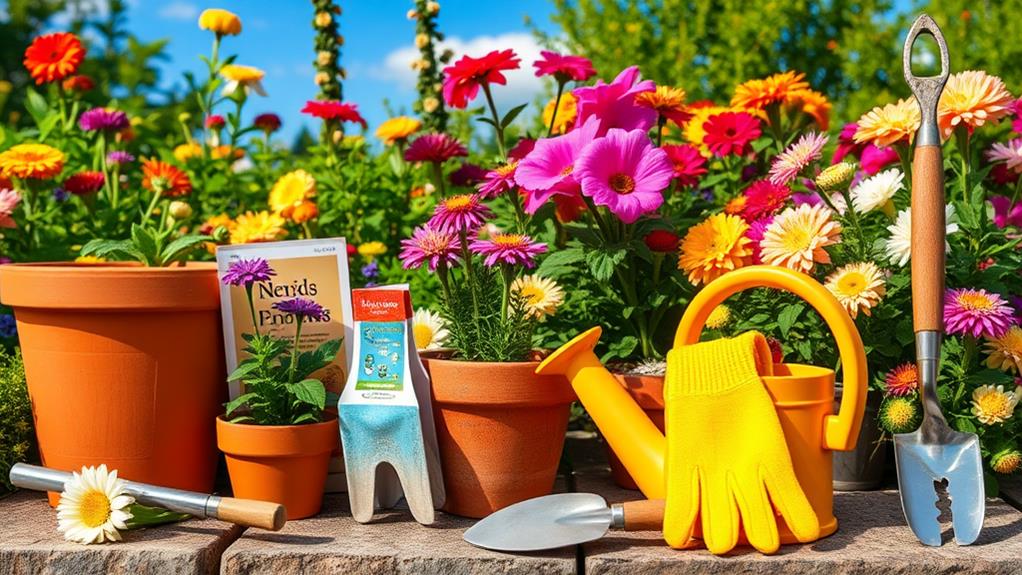
Have you ever wondered how the right planting accessories can make all the difference in your gardening success?
These tools not only simplify your tasks but also enhance your plants' growth. With the right accessories, you can create a thriving garden environment effortlessly.
Here are three essential planting accessories you'll want to have:
- Planting Trays & Seedling Pots: These are perfect for starting your seeds indoors. They provide a controlled environment for seedlings, guaranteeing they've the space and nutrients they need to thrive.
- Garden Gloves & Transplant Tools: Protect your hands while you work. Good gloves prevent blisters and cuts, while transplant tools make it easy to move seedlings without damaging their roots.
- Watering Cans & Soil Scoops: Proper watering is vital for plant health. A quality watering can guarantees even moisture distribution, while soil scoops help you transfer soil efficiently without spilling.
Don't forget plant markers to keep track of your varieties, plant supports for stability, and seed storage solutions to organize your seeds.
With these accessories, you're well on your way to a flourishing garden!
Garden Decor Ideas
When you step into your garden, the right decor can transform the space into a personal oasis that reflects your style and enhances its beauty. Consider adding elements that not only beautify but also create an inviting atmosphere. Here are some ideas to get you started:
| Decor Idea | Description | Benefits |
|---|---|---|
| Garden Art | Unique sculptures or wall art that resonate with you. | Adds personality and charm. |
| Outdoor Lighting | String lights or lanterns to illuminate pathways. | Enhances safety and ambiance. |
| Decorative Pots | Colorful pots with plants or flowers. | Brings vibrancy and life. |
| Garden Signage | Personalized signs to label plants or areas. | Creates a whimsical garden feel. |
| Seasonal Decor | Seasonal accents like pumpkins or wreaths. | Keeps the garden fresh and lively. |
Incorporating vertical gardens can maximize space and add greenery, while well-defined garden pathways guide visitors through your blooming oasis. With these ideas, you can create a gorgeous, customized outdoor retreat that you'll love spending time in.
Sustainable Gardening Supplies
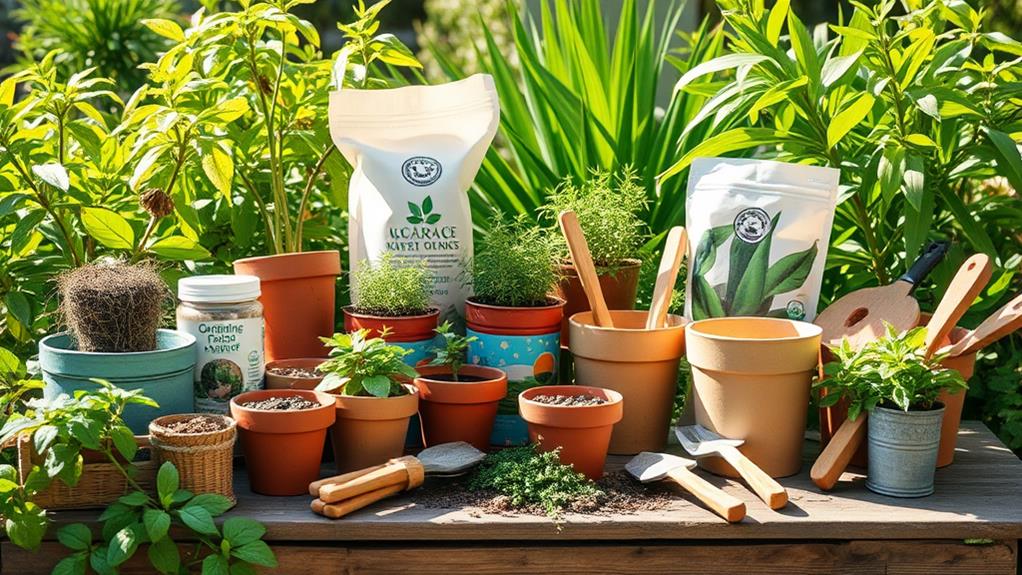
Sustainable gardening supplies are essential for anyone looking to cultivate a thriving garden while minimizing their environmental impact.
By choosing the right materials and techniques, you can create a beautiful outdoor space that supports local ecosystems. Here are three key areas to focus on:
1. Eco-Friendly Containers: Opt for biodegradable materials or recycled pots to reduce waste. These options not only look great but also support your plants' growth without introducing harmful chemicals.
2. Native Plant Selections: Incorporating native plants into your garden promotes biodiversity and requires less water, making it easier to practice water conservation.
They're adapted to your local environment and attract beneficial wildlife.
3. Composting Techniques: Implement organic gardening practices by setting up a composting system. This not only recycles kitchen scraps but also enriches your garden soil, aligning with permaculture principles.
Consider attending gardening workshops or joining community gardening initiatives.
These can help you learn more about sustainable landscaping and connect with fellow gardeners who share your passion for eco-friendly practices.
Online Gardening Retailers
With a wealth of options available at your fingertips, online gardening retailers have revolutionized how you shop for gardening supplies. You can explore an incredible product variety, from seeds and soil to tools and decor, all from the comfort of your home.
Be sure to check online reviews before purchasing; they provide valuable insights from fellow gardeners. Most retailers offer flexible shipping options, ensuring your supplies arrive promptly. Pay attention to customer service ratings, as good support can make your shopping experience smoother.
Seasonal promotions can also help you snag great deals, so keep an eye out for those. Many online stores feature gardening blogs filled with tips and tricks, enhancing your gardening knowledge. If you're looking for gift ideas, many retailers offer curated gift sets perfect for any gardening enthusiast.
When making purchases, consider the payment methods available to find what suits you best. Finally, understanding return policies and loyalty programs can save you time and money in the long run.
Local Garden Centers
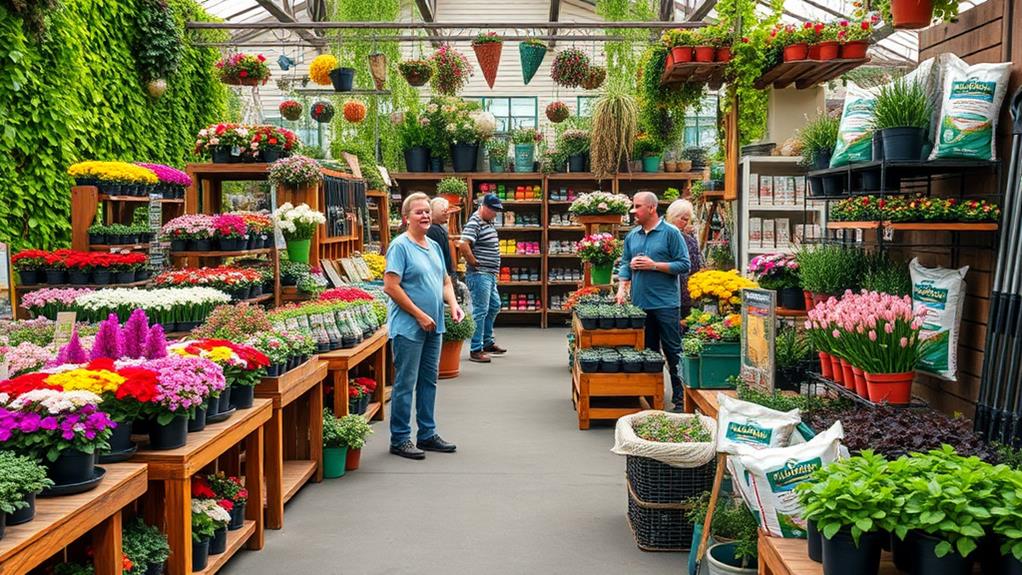
When you visit local garden centers, you'll discover a wealth of benefits that online retailers simply can't match.
Not only do these centers offer popular gardening products, but they also provide personalized advice and a chance to connect with fellow gardening enthusiasts.
Supporting local businesses enhances your gardening experience and helps you find exactly what you need for your green space.
Benefits of Local Centers
Shopping at local garden centers offers numerous advantages that can enhance your gardening experience. By choosing a local center, you support community engagement and connect with fellow gardening enthusiasts.
Here are three key benefits you can enjoy:
- Expert Advice: Local staff often have extensive knowledge about native species and sustainable practices. You can ask questions and get tailored advice specific to your garden's needs.
- Unique Plants: Many local centers stock unique plants that aren't available in larger chains. You might discover rare varieties or native plants, perfect for attracting local wildlife to your garden.
- Community Events: Local garden centers frequently host workshops, gardening clubs, and plant swaps. These events are great for learning new skills, sharing tips, and building connections with fellow gardeners.
Additionally, keep an eye out for seasonal promotions, which can make your gardening projects more budget-friendly.
Embracing local workshops not only enriches your gardening knowledge but also fosters a sense of belonging in your community.
Popular Gardening Products Offered
Local garden centers aren't just hubs for community engagement; they also offer a diverse range of popular gardening products that cater to every gardener's needs.
You'll find everything from seeds and seedlings to pots and garden tools, making it easy to start or enhance your gardening journey.
One of the most exciting trends in gardening today is the shift towards eco-friendly products.
Local centers often stock organic fertilizers, biodegradable pots, and natural pest control solutions. By choosing these options, you're not only nurturing your plants but also supporting sustainable practices that benefit the environment.
Moreover, you can discover a variety of trendy gardening tools designed for efficiency and ease of use.
Whether you're looking for ergonomic hand tools or self-watering planters, local garden centers have got you covered.
Don't forget to check out their selection of native plants and pollinator-friendly flowers, which are becoming increasingly popular.
By incorporating these into your garden, you'll contribute to local biodiversity while creating a stunning landscape.
Frequently Asked Questions
What Are the Best Gardening Gloves for Sensitive Skin?
When you've got sensitive skin, finding the right gardening gloves is essential.
Look for gloves made from natural materials like cotton or bamboo, as they offer breathability and comfort.
Opt for gloves with a soft lining to prevent irritation. Additionally, gloves with a snug fit can help keep dirt out while protecting your hands.
Brands that focus on hypoallergenic options are worth considering, ensuring you enjoy gardening without worrying about skin reactions.
How Can I Store Gardening Tools Properly?
Did you know that 70% of gardeners struggle with tool organization?
To store your gardening tools properly, start by designating a specific area, like a shed or garage. Use pegboards or shelving units for easy access and visibility.
Consider labeled bins or containers for smaller items. Hanging tools on hooks can save space and keep everything tidy.
With these storage solutions, you'll find your tools quickly and keep your gardening area clutter-free!
What Is the Best Time to Start a Garden in the UK?
The best time to start a garden in the UK is during spring planting, typically from March to May.
This season offers the perfect conditions for growth, allowing you to plant seasonal crops like peas, carrots, and lettuce.
You'll want to prepare your soil and select seeds suited for the climate.
By getting started early, you'll maximize your harvest and enjoy a vibrant garden throughout the warmer months.
Happy gardening!
Are There Gardening Apps to Help With Planning?
Imagine your garden as a blank canvas, waiting for your creative touch. To bring your vision to life, gardening apps can be your guiding compass.
They offer planting calendars to help you know when to sow seeds and provide tools for designing your garden layout. With these digital allies, you'll effortlessly plan and manage your garden, ensuring it flourishes beautifully.
How Do I Attract Beneficial Insects to My Garden?
To attract beneficial insects to your garden, start by planting pollinator plants like lavender, sunflowers, and coneflowers.
These flowers provide nectar and pollen, drawing in bees and butterflies.
Additionally, consider adding insect hotels, which offer shelter for beneficial insects like ladybugs and lacewings.
Place them in sunny spots and keep your garden chemical-free to create a welcoming environment.
You'll enjoy a thriving ecosystem that naturally helps with pest control and pollination!
Summary
In the UK, 27% of households are now involved in gardening, highlighting just how popular this hobby has become. Whether you're just starting or looking to refine your skills, investing in quality gardening supplies can make all the difference. From essential tools to sustainable options, there's something for everyone. So, gear up, get your hands dirty, and watch your garden flourish. Your green oasis awaits!
